
Overcome Loneliness
Ease Anxiety
A 2012 review article in Frontiers in Psychology examines the impact of the human-animal bond on different physiological variables. The summary explained that several studies demonstrated how interaction with a friendly animal such as a dog effectively reduced fear and anxiety.
Help Us Relax
Reduce Stress
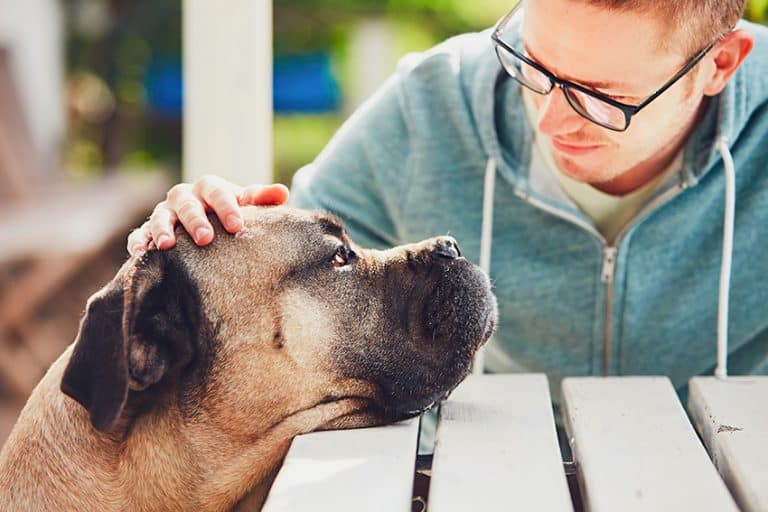
Dogs Make Us Happy
A 2009 study in Japan revealed that looking into Fido’s eyes triggers a release of oxytocin, which is sometimes called the “cuddle” or “love hormone”. This substance enhances our sense of bonding and well-being. In another investigation involving seniors, people over 60 that live alone were 4 times less likely to become depressed if they had a pet than if they didn’t live with a furry friend.

They Make Us Laugh
There are some studies that suggest people with pets laugh more often than those without pets . The great thing about this is that laughter has many emotional and physical benefits.
Help With Weight Loss
Studies show that regular walks with your four-legged friend can help you lose weight. In one research project, public housing residents who walked loaner dogs for 20 minutes a day, five days a week lost an average of 14.4 pounds in a 50-week study period. In addition, the Wellness Institute at Northwestern Memorial Hospital in Chicago conducted a year-long survey that showed pairing obese patients with overweight dogs for a walking program helped both parties drop pounds.
Reduce Trips to the Doctor
Particularly for seniors, owning a pet may help reduce the number of visits to the doctor. A one-year study of 938 medicare enrollees suggests that dog owners are less likely to see their physician after a stressful life event than individuals without a pet.
Motivate Us to Exercise More
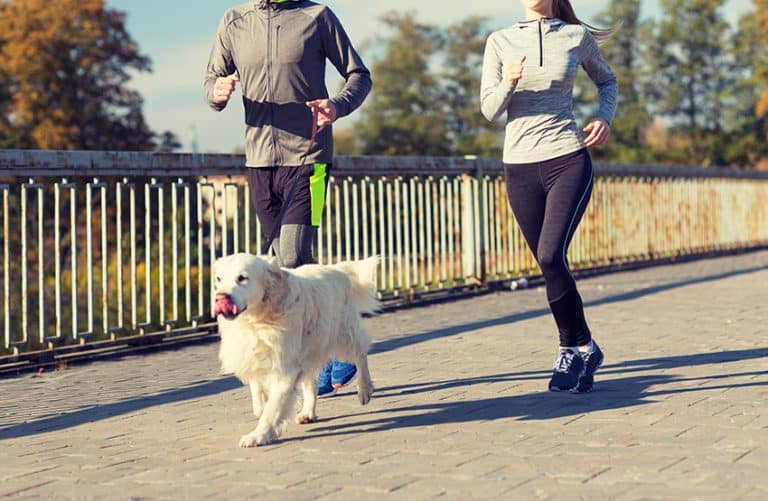
Lower cholesterol and triglyceride levels
In addition to helping to relax us and lower our blood pressure, dogs may positively impact our cholesterol and triglyceride levels. One large study showed some correlation between dog ownership and lower levels of these blood lipids, but the findings weren’t conclusive.
Longer Life
Add Structure and Routine
Enhance Our Joy
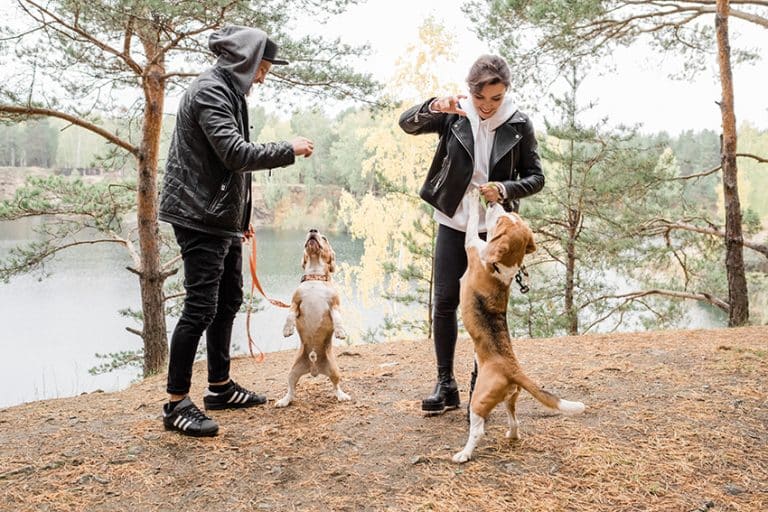
This is closely related to the way that dogs make us happy. Interacting with a pooch can boost our oxytocin level, which gives us a sense of emotional well-being. For older adults, a dog can also increase morale and provide a sense of self-worth.
Just think about how much joy these famous dogs added to your life. You got all the benefits, without owning one of them.
Savings From Fewer Doctor Visits
Improved Pain Management
A 2003 study found that human-dog interactions resulted in increased levels of beta-endorphin, oxytocin, and other substances that help with pain management. A 1996 report on the psychosocial and psychophysical effects of human-animal contact also showed that people receiving animal-based therapy used fewer pain relievers to manage their condition.
Reduced Illnesses
It may sound counterintuitive, but dogs help us stay healthy. They bring germs into the house that our bodies may not otherwise encounter, and that gets our immune system working. In 2012, scientists released a report on a cohort study conducted on 397 infants in Finland that suggests contacts with a dog in the first year of life may boost resistance to respiratory illnesses.
Improved Heart Health
A 2002 study of 240 married couples showed that individuals with pets had lower blood pressure and lower heart rates when compared to those without pets. There’s also good news for dog owners that have had a heart attack. Research shows that patients with a canine companion may outlive those that don’t have a furbaby.
Companionship

Kristen Fuller, M.D. and clinical mental health writer says, “Dogs are one of people’s most popular companions.” They offer us unconditional love and a warm greeting when we come home. Caring for a pet helps us to feel needed and overcome our loneliness. What’s more, most people talk to their furry friends and may use them as sounding boards to work through problems.
They Fulfill Our Need for Touch
Surviving a Major Illness
We’ve seen how dogs can help heart attack patients live longer. This human-animal interaction also benefits people who have had a stroke or other circulatory illnesses. Single-person households with a canine companion demonstrated a reduced risk of death after a heart attack (33% less) or stroke (27% less).
They Boost the Immune System
Scientists have found that having a dog (For ex. a Yorkie) in the house can impact the types of bacteria found in the home. With this in mind, researchers at the University of Arizona proposed a study in 2015 to determine whether the microbes our pups share with us benefit our immune system. The results are not yet available.
Lower Blood Pressure
Better Sleep and Coping With Insomnia

Helps Reduce Fears and Phobia
Improved Mental Health
Evaluating 17 studies on the impact of the human-animal bond, a team of researchers from the Universities of Liverpool, Manchester, and Southampton concluded that pets can have a positive effect on patients with mental health disorders. Pets help people manage their conditions, overcome loneliness, and find a sense of purpose, among other benefits.
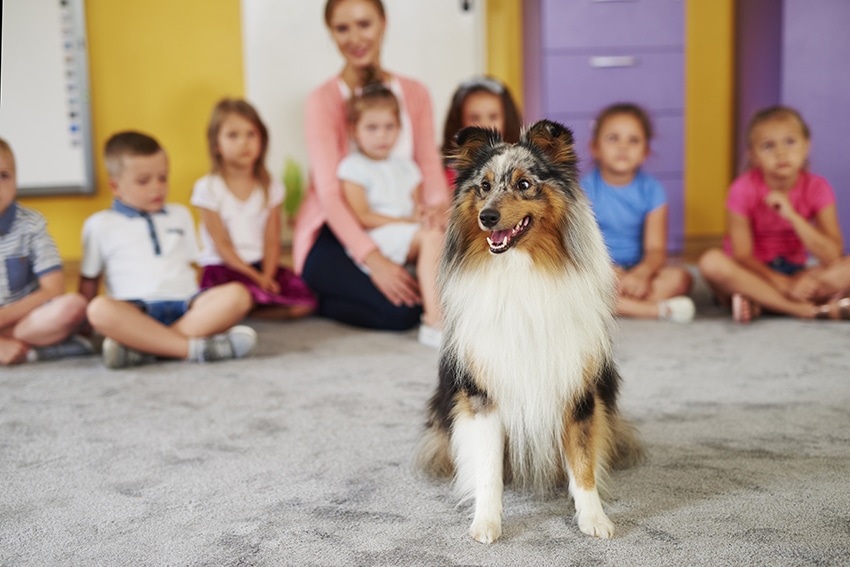
Reduces Risk of Allergies
Improves the Immune System
One study involving 397 children found that babies living in homes with dogs may be less likely to get respiratory tract infections like colds and ear infections than those in pet-free homes.
Eases Separation Anxiety
Helps Build a Positive Self-Image
Help Children With ADHD
Reduce Aggression
They Help Kids Learn Perseverance
They Help Kids Learn Responsibility
Teach Kids About Loyalty
Dogs are our faithful companions. Their constant loyalty provides a model for children that shows them how we should treat one another.

Reduce the Risk of Asthma
Several reports suggest that the dander or “dog dust” from our pups may help protect children from developing asthma when they get older.
Reduce the Risk of Eczema
Studies indicate that prenatal and infant exposure to dogs can reduce the likelihood that children will develop allergic reactions like eczema later in life.
Stimulate Curiosity and Imagination
Inspire Motivation
Owning a pet like a dog can build several skills such as responsibility and respect for others. When your child contributes to caring for Fido, they build an internal motivation that can help them in other areas of life.
Teaching Respect

Nightmare Control
Increases Learning in Children With Developmental Disabilities
The use of Animal Assisted Interventions with children with developmental disabilities has promising results. Allowing human-dog interactions in the learning environment appear to help with relaxation, motivation, concentration, and attention. Regular play breaks with a furbaby can also boost alertness during the day.
Dogs in the Classroom Improve Cognitive and Reading Skills
Bringing a therapy dog to the classroom or local library can be beneficial to a child’s education. A study from the National Institutes of Health reports, “The presence of a dog in an educational setting seems to support concentration, attention, motivation, and relaxation reflecting a reduction of high stress levels which inhibit effective learning and performance.”
Increased Empathy
A study published in 2017 looked at the impact of children’s attachment to their pets. The researchers found that kids that showed a strong bond with the family furbaby had greater compassion and empathy towards animals. The results were strongest among children aged 7-12 that had a dog at home.
Improved Social Skills
Increased Verbal Skills
Provide Emotional Support
From calming our fears to offering unconditional love, dogs are a source of emotional support. Studies show that children who bond to a dog may find more emotional support from the family pet than from their human relationships.
They Make Children Happy
Reducing Stress in Children
Studies demonstrate that interacting with a dog changes the levels of norepinephrine, epinephrine, and cortisol in the blood. These neurotransmitters help to reduce stress. Letting your child play with or pet Fido can help them cope with stressful situations.
Understanding the Cycle of Life
They Provide Stability
Dogs can help give children a sense of security and stability that gives them the confidence to explore the world around them. In addition, a bond with a pooch may enable kids to regulate their emotions and cope with uncertain situations like divorce or foster care.
They Can Help An Only Child

They Teach Selflessness
They Improve Fast Thinking
Reducing Anxiety in Children
A 2015 study from the Centers for Disease Control compared kids living with dogs to those in non-pet homes. The researchers found that children with pet dogs at home had significantly lower levels of anxiety than kids without a furry friend.
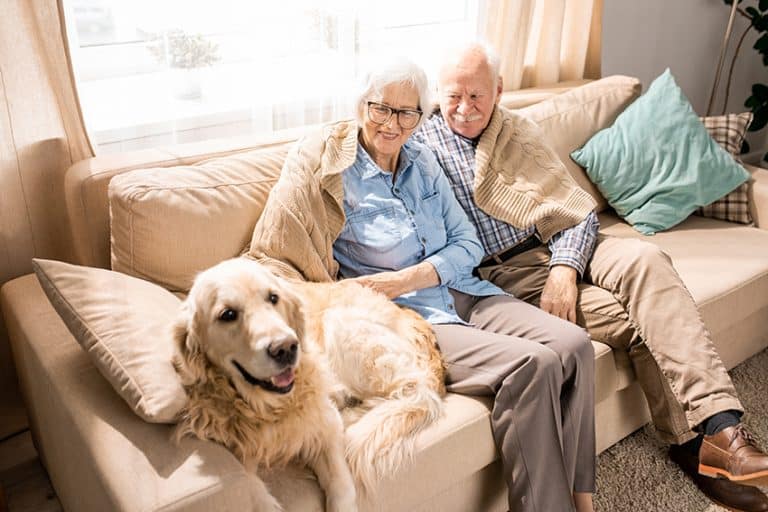
Companionship
Socializing
Seniors can still feel isolated even if they join a retirement or senior living community. Getting a dog to care for helps foster friendships with their fellow residents.
Caring For a Dog Gives a Sense of Purpose
Promotes Living in the Present
Increases Mobility and Independence
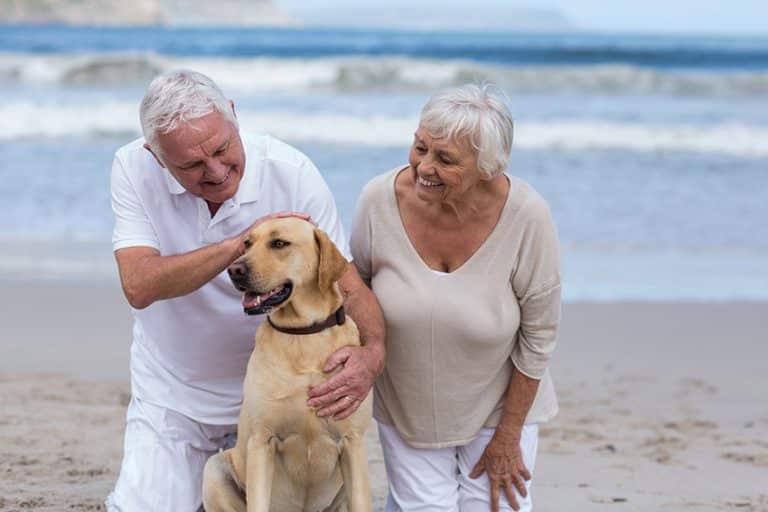
Dogs Keep Them Active
Dogs need to go for walks every day. As seniors bond with their special pals, they often take longer and more frequent strolls to enjoy the companionship. A 2016 study from the University of Missouri linked bonding with a dog to more frequent activity and a string of social and physical benefits.
Alzheimer Assistance
Help People With Parkinson’s
A service dog can be a helpful partner for a senior with Parkinson’s. These pooches are trained to assist their owners with balance and walking and help them get up from a chair or after a fall. When the patient stumbles, the pup can also alert other family members. Of course, having a dog also keeps their humans moving, and exercise can benefit people suffering from Parkinson’s.
Dementia Assistance
As life expectancy increases, more seniors are showing signs of decline in memory and cognitive abilities. Service dogs can be trained to assist individuals in the early and middle stages of dementia. Pups thrive on routine and can help their elderly caregivers remember things like medication and mealtimes. As walking companions, they can also lead their humans home so that they don’t become lost.
Help to Ease Anxiety and Pain

We’ve mentioned that canine companions can help relieve feelings of anxiety by triggering the release of neurotransmitters like norepinephrine and oxytocin. Because there’s a physical connection between stress, anxiety and chronic pain, having a dog in your later years may help alleviate pain from arthritis and other conditions.
Protection

Improve Home Security
Family Bonding Time

Dogs provide extra incentive for a family to spend time together. Plan a trip to the local bark park, take a walk with the kids and Fido, or get the whole family involved in training your new puppy. A side benefit is a socialization with other people in the neighborhood.
Dogs Bring the Family Together in Decision-Making
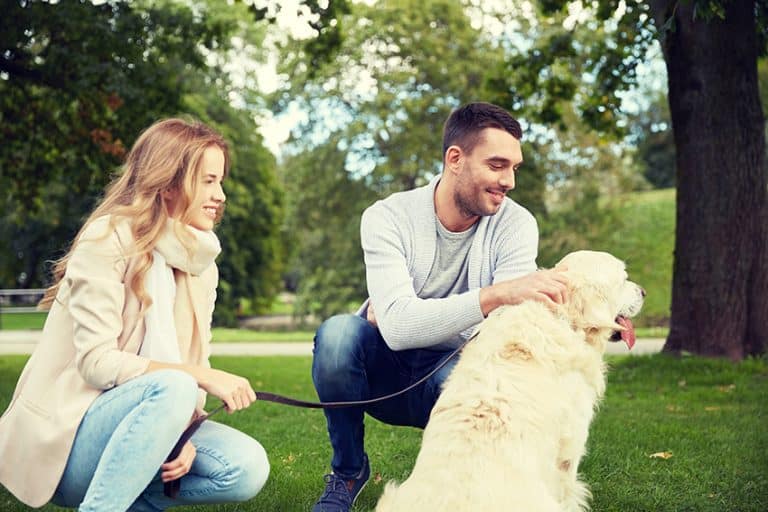
They Help to Start and Maintain New Friendships
Dogs can be terrific ice breakers. It’s common for owners to stop and chat with others while they’re at the local bark park or walking with their pup. One survey showed that pet owners were 60 % more likely to meet new people in their neighborhoods than those without an animal.
They Boost Confidence
They Increase Self-Esteem
A series of studies conducted at Miami University and St. Louis University in 2011 found that pet owners had higher scores for self-esteem, tended to be more conscientious, felt more socially fulfilled, and were more able to recover from rejection than non-pet owners.
Dogs Improve Mindfulness

Dr. Ann Berger from the NIH Clinical Center in Bethesda, MD, says, “The foundations of mindfulness include attention, intention, compassion, and awareness.” Most dogs naturally model this behavior so that we can learn to be more mindful.
They Can Make You Appear More Attractive
They Help You Get Ready to Have Kids

They Help You Keep Balance
Depending on your major, college life can be really stressful, so some universities are using animal visitation to help students cope. A study conducted at Washington State University evaluated the effects of petting a dog for 10 minutes. They found that people who had the animal contact had lower cortisol (a stress hormone) levels than those who were not able to see or touch a pup.
They Can Help to Fight Homesickness

Going away to college can be a traumatic experience for some students. Assistant Professor John Tyler Binfet of the University of British Columbia’s Okanagan campus says that enrollees are more likely to drop out if they’re experiencing homesickness. He and his colleagues conducted an 8-week study on the effect of interaction with therapy dogs with first-year students. Participants in the program showed decreased levels of homesickness than those that did not interact with the pups.

They Help Maintain Balanced Stress Levels
They Boost Office Morale
Increase Productivity
Contrary to what you might expect, bringing dogs into the office tends to increase employee productivity rather than distracting them from their jobs. Some studies suggest that people have enhanced performance when they’re happier and not experience stress. Incorporating breaks where your workers can interact with a dog may boost their performance.
They Help Improve Communication
Employee Retention
When you can keep morale up and your employees happy, it’s easier to keep people in the company. Low turnover benefits productivity and your bottom line. According to Fortune.com, 53% of workers currently in non-pet-friendly offices say they’d be more likely to stick around if their boss let them bring their pet to work.
Improved Teamwork Makes the Dream Work
Dogs can improve teamwork through increased trust and collaboration according to a study conducted at Central Michigan University. People who worked together on a project while a dog was present, “ranked their team-mates more highly on measures of trust, team cohesion and intimacy than those who had not.”
Encourages Healthy Living
You can incorporate a dog into your employee wellness plans. After all, Fido needs to get outside from time to time. Set up a walking rotation to get your workers moving. A quick walk in the fresh air can increase productivity as much as 60%.
Millennials Want Pets
For many millennials, the ability to have a pet at work is a huge selling point. According to Bob Vetere of the American Pet Products Association, if you let this generation bring their pet to work, “you get someone more comfortable at the office and a person willing to work longer hours.”
They Improve Your Company Image
Improved Work/Life Balance
When your employees can bring Fido to work, it helps them balance their home responsibilities with work demands. They won’t need to run home to feed and walk the dog because he’s at the office. With their faithful friend by their side, workers can also incorporate some rest and relaxation into the day when the dog needs a potty break.
Reduced Absenteeism
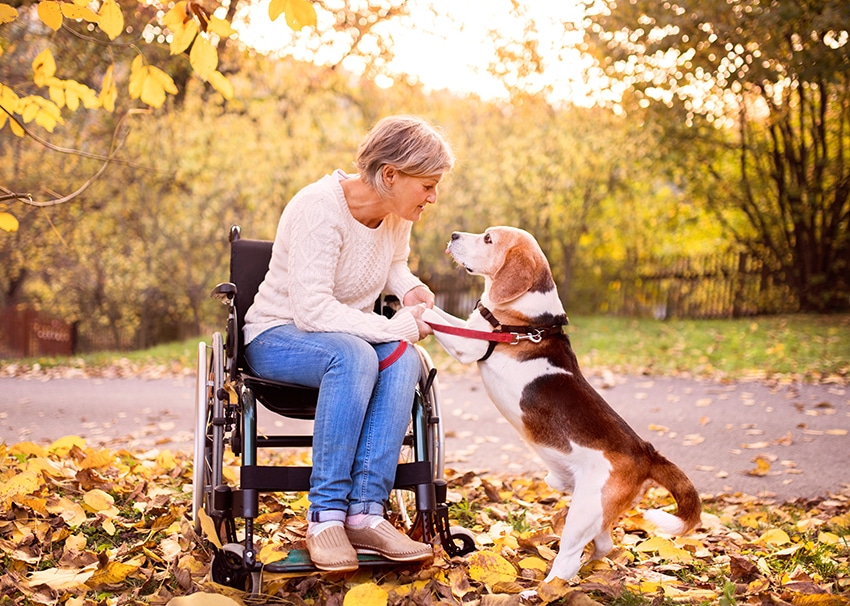
Lupus
Type 1 Diabetes
One surprising study showed how the responsibility of caring for a pet fish helped teenagers manage their diabetes. Having a regular routine carried over into other areas of daily life. The kids that had responsibility for a pet were more disciplined about monitoring their blood glucose levels.
Autism
Recovery From Brain Injury or Stroke
- provide comfort
- ease feelings of loneliness and isolation
- motivate patients to move
- give them a sense of purpose
- help people relearn the art of communication
These are a few of the ways that service dogs aid in brain rehabilitation.
Coping With OCD

For a person suffering from Obsessive-Compulsive Disorder (OCD), a trained pup can help prevent destructive behaviors like picking at your skin or pulling your hair. A pooch trained as an OCD service dog recognizes negative behaviors and will do something to distract you and disrupt the activity. They also help to ease the anxiety that a person with OCD might experience.
Addiction Recovery
- providing a healthy outlet for feelings of anxiety and depression
- restoring confidence and feelings of self-worth
- teaching responsibility
- helping people learn to control their emotional responses
Help With Sleepwalking Disorder
Sleepwalking can be dangerous. With a trained service dog, many of the risks can be minimized. A pooch can learn to close doors and windows and move obstacles to make a clear path. They can also walk beside their owner and guide them during a sleepwalking episode.
Coping With Narcolepsy/Excessive Daytime Sleepiness (EDS)
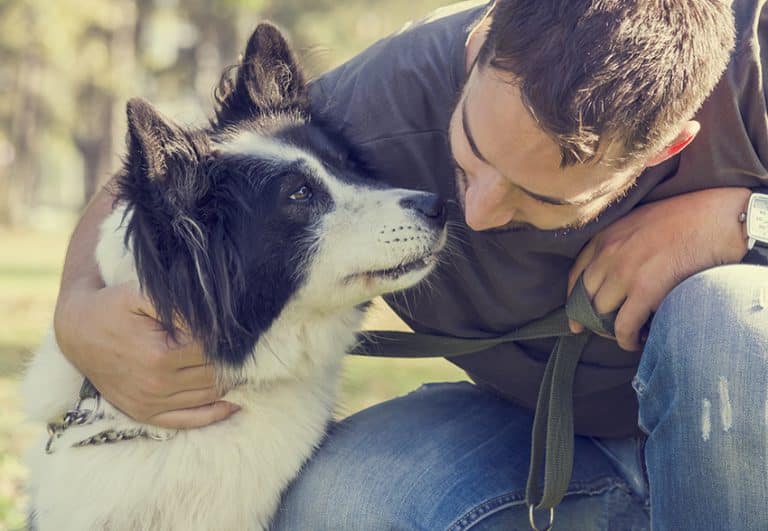
A person with narcolepsy or EDS can fall asleep suddenly with little warning. From observations in her clinic, Mary McNeight, CPDT-KA, CCS, BGS of Service Dog Academy in Washington reports that dogs may be able to give a 5-minute warning of an oncoming sleep attack. This provides time for the individual to sit or lie down or for the pup to stand in front of their owner and break their fall.
Coping with Obstructive Sleep Apnea (OSA)/Parasomnias
Coping With Bipolar Disorder
Seizures
Depression
Post Traumatic Stress Disorder (PTSD)

Coping With Panic Attacks
Coping With Hallucination
A person struggling with hallucinations or paranoia may benefit from owning a service dog. These pups can help their owners distinguish between delusions and reality. When a person isn’t sure if they’re hallucinating about people, they can command Fido to greet the visitor(s). If their furbaby doesn’t respond, they know nobody’s there.
What’s Your Reason for Having a Dog?

It doesn’t matter whether you’re old or young, single or married with children, there are lots of benefits to owning a furbaby.
What about you? Why did you or would you get a dog?
Leave a comment below. If you have a reason or benefit that I missed, I’ll add it to the list.



This is such a great post. Dogs are the best animal on the planet in my eyes, and we can learn so much from them at all stages of our life.
Adam
An incredibly valuable article, with an in-depth look into beautiful relationship between canine and human.
As a bereavement companion, we work closely with those faced with significant loss. Often having accessibility to dogs while moving through their grief process, the bereaved find themselves calmed and comforted by the unconditional love of a dog.
Dogs r the best creatures on our planet. I have tow pomeranians opposite breed abd 7 street dogs. I LOVED THEM, LOVE THEM AND WILLL ALWAYS…
I’m glad to know that it’s scientifically proven that dogs makes us happy because interacting with them releases oxytocin. I live alone in my apartment and I have no one in my life right now. Don’t get me wrong though, I love being alone because I value my privacy more than anything. But, you know, it wouldn’t hurt to have a companion every now and then. Upon reading your article, I think now is the right time for me to have a dog. I’ll make sure to find the cutest German Shepherd puppy near my area.